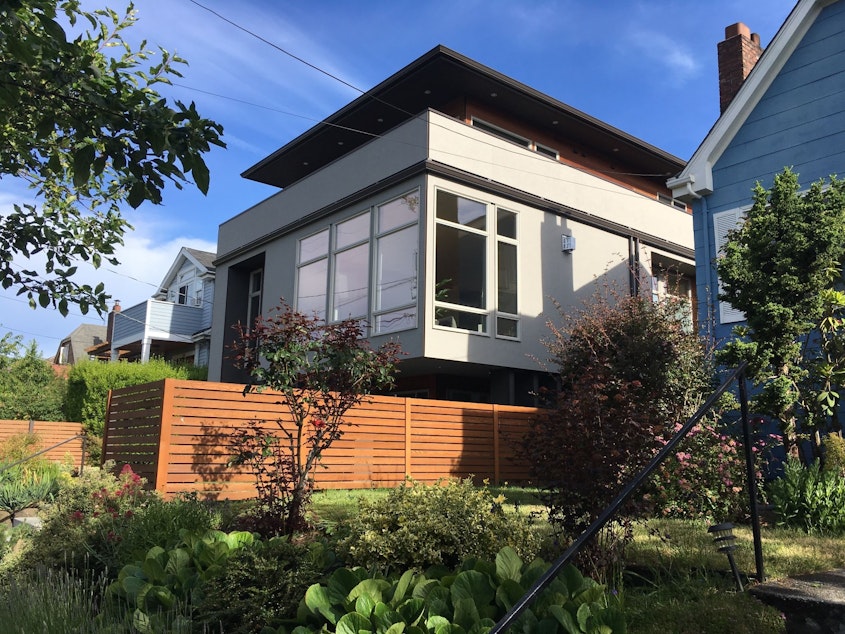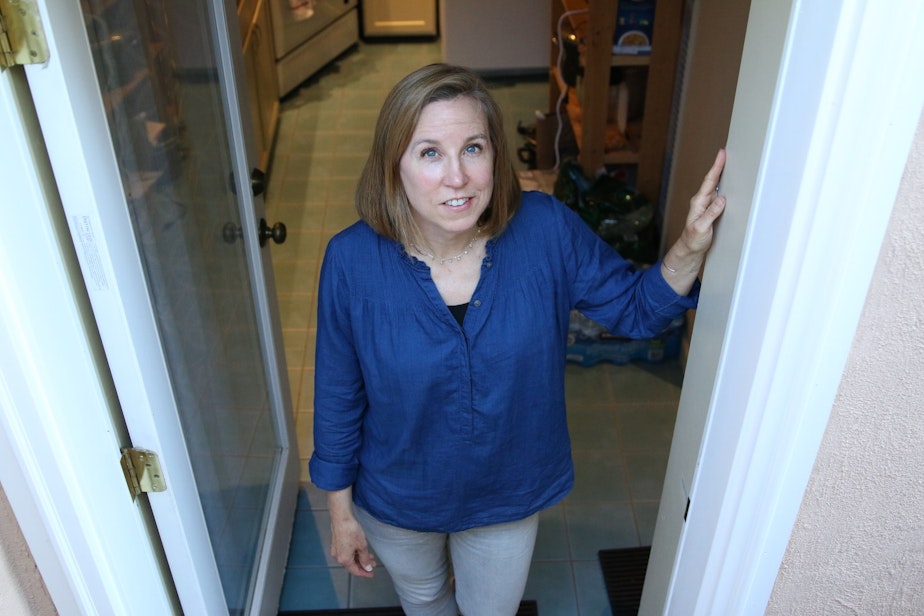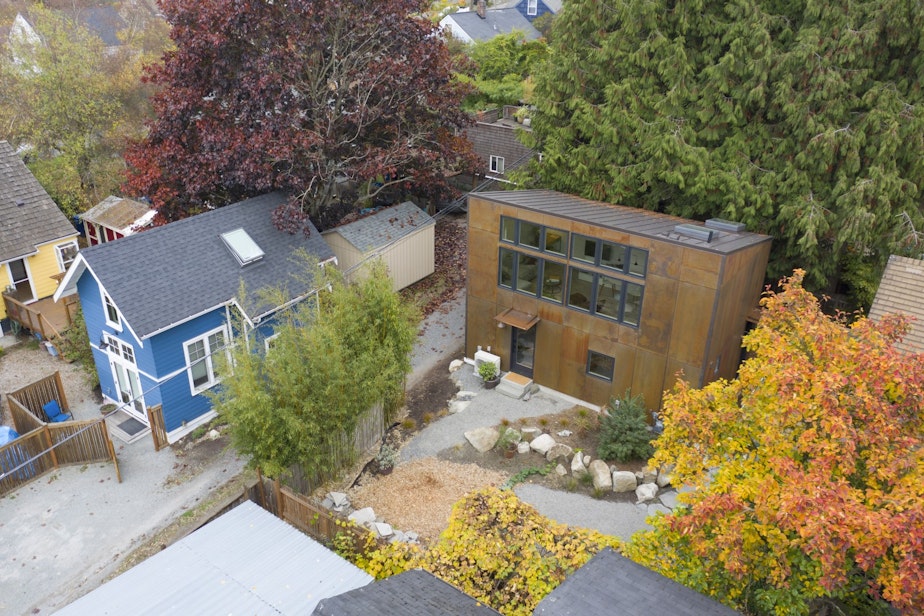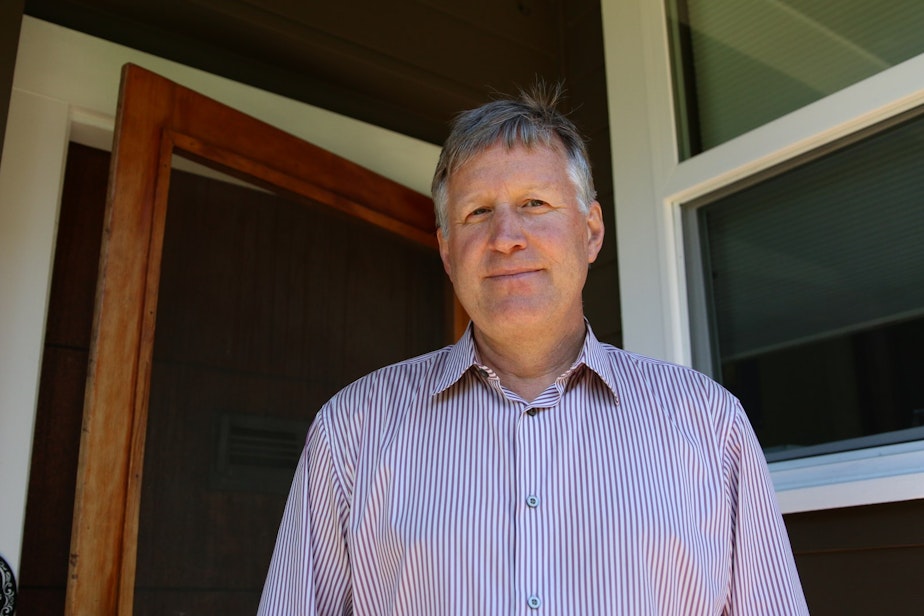Seattle bill pits McMansions against backyard cottages

The fight to bring more backyard cottages and granny flats to residential zones in Seattle has a new twist: A bill that would make them easier to build would also ban super-sized homes.
That bill comes up for an important committee vote in the City Council on Tuesday. It highlights the tension between people who want affordable places to live and people who need larger homes for growing families.
Sarah Swanberg lives in Seattle’s Bryant neighborhood, and sometimes when she walks around, she notices big new homes where there used to be smaller bungalows. She says she and her neighbors don’t like those houses.
“I mean, the term 'McMansion' is not said in love,” she said. “It’s a derogatory term. I don’t think it’s necessary for a family to have a 4,000 square foot home. I think it’s kind of a waste of space — we live in a city.”
In 2006, Swanberg remodeled her home, adding bedrooms to grow her house to just over 2,000 square feet on the upper floors and ended up with 650 square feet the family didn’t need on the bottom floor. She could have used it as a bonus room or a TV room, but instead, she put in a little kitchen and prepared to rent it out as a “granny flat.”
At first, she worried nobody would want to live below her family, with all its kids and dogs. She warned the prospective renters there’d be noise.
Sponsored
“But they said, ‘We don’t care. We’d rather live here than in an apartment with people coming and going and partying late at night,” Swanberg said.
She said she’s happy they signed on, because they renew their leases, time and time again, and like living in the house.

Swanberg’s story illustrates two different faces of new legislation being considered by the Seattle City Council this week.
On the one hand, Seattle would ban super-sized homes, by limiting new homes to 2,500 square feet on a standard lot, making Swanberg's modest standard the legal standard. The city says almost half the single family homes built since 2010 would have been disqualified under that standard.
On the other hand, the legislation would encourage more granny flats and backyard cottages by reducing barriers that limit their popularity. For example, they would no longer need a parking stall, and the square footage wouldn’t count towards the maximum size of a home.
Sponsored

City Councilmember Mike O’Brien has been working on the backyard cottage part of this bill for years. The part banning large homes was added more recently. But he said the two parts work together to address a big problem.
“A lot of builders are tearing down single family homes and then building the biggest thing they can build on that lot, because they make a profit off of square footage,” he said. “And there’s a market for that. I mean, obviously these things sell, even if sometimes they’re ridiculously expensive compared to what some of us long-time Seattleites think is normal.”
O’Brien said he doesn’t want to deny builders their profit, but he does want to redirect them so they’re making their profit by building more units rather than just bigger homes, so that more families can live in single family zones. Many builders do both kinds of work.
Sponsored

At a City Council hearing Tuesday night, most people testified in favor of the bill. There were architects who said they have clients lined up to build backyard cottages and renters looking for an affordable place to live.
But homeowner Josh Brothers spoke in defense of larger homes.
“We’re not looking to create a McMansion, to create a massive house,” he said. “We’re looking to expand and remodel in a way that accommodates my family. I really don’t want to leave Seattle, I don’t want to live in the suburbs, but these limits are going to force me to do this.”
Sponsored
Homeowners determined to build big houses may still have a way to do that legally, according to Erich Armbruster, president of Ashworth Homes, a development company.
He said homeowners that want to grow significantly can still dig down, because basements don’t necessarily count towards the maximum home size and clients can always build a backyard cottage and use it as an office. A planning department spokesperson confirmed these points.
“But as far as just building a larger home without either of those two components – you’re up a creek,” Armbruster said.
A City Council committee will consider amendments to the bill Tuesday.
Councilmember Lisa Herbold’s amendment bans short-term rentals in cottages, keeping them from just becoming AirBnBs or the like.
And Councilmember Bruce Harrell's amendment suggests if a homeowner puts a granny flat and a backyard cottage on their lot, they may have to include at least one parking space.
The full council is tentatively scheduled to vote on the whole thing July 1.



